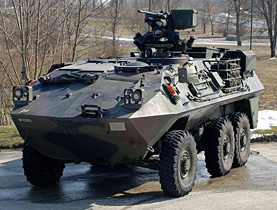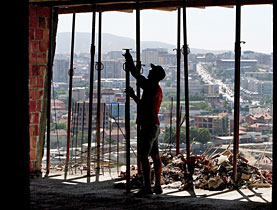Cabinet aims for clearer weapons export laws

Switzerland's cabinet has come out against a people's initiative to prohibit the export of war materials and will not be forwarding a counter-proposal.
Instead, it announced on Wednesday that it had clarified how existing legislation, which in theory already restricts the export of weapons to certain states, would be applied.
The modification to the ordinances was not a rejoinder to the 109,224 signatures submitted by the pacifist group Switzerland without an Army last September, said the State Secretariat for Economic Affairs (Seco), but rather a response to the request of a parliamentary committee delivered in 2006.
“It was a recommendation from the Swiss parliament two years ago,” Simon Plüss, head of export controls for war materials at Seco, told swissinfo. “We have tried among other things transferring the existing practices into the ordinances.”
To that effect, cabinet’s new directive should help Seco, the unit within the economics ministry in charge of enforcement, interpret and apply the existing legislation.
Switzerland without an Army called the cabinet’s move a “sham clarification”. Wednesday’s announcement would not prevent states in conflict and regimes that violate human rights from acquiring weapons, according to the coalition of 35 peace groups and leftwing political parties.
Its own plan calls for constitutional amendments disallowing the export of military hardware – including so-called dual use goods – with an exemption for demining equipment used in humanitarian situations.
Parliament still has to discuss the proposal before a date is set for a nationwide vote on the issue.
In 1997 more than 77 per cent of Swiss voters rebuffed a similar proposition.
Five “clarifications”
On Wednesday the cabinet said no state involved in armed conflict – either international or within its own borders – would be able to purchase weapons from Switzerland.
Systematic and serious human rights violators would also be blacklisted, as would poor states receiving humanitarian assistance from Switzerland. Regimes likely to proliferate and those who might use the weapons on their own citizens would also be banned.
Seco says that previous decisions were already based on several of those criteria.
“The goal of this position is to have clear criteria for future demands,” Plüss said. “Particularly the criteria for systematic and severe violators of human rights is nothing new.”
In April the Swiss government imposed sanctions on Chad after the Central African country outfitted the Swiss-built Pilatus PC-9 training aircraft with bombs and used it to attack positions in the Sudan’s Darfur region. This contravened Switzerland’s yet to be clarified export restrictions.
Two months later, Seco approved the export of machine guns, grenade launchers and anti-aircraft systems to Saudi Arabia, South Korea and Egypt. Switzerland’s biggest customer for the first half of 2008 has been Pakistan.
Economic impact
In a statement released on Wednesday, the cabinet said a ban on weapons exports would lead to the loss of thousands of jobs and that it would jeopardise the country’s national defence capabilities.
Economics Minister Doris Leuthard told a media conference in Bern, the Swiss capital, that the ban would kill around 5,100 jobs domestically, worth SFr485 million ($441 million) a year.
The hardest-hit cantons would include Zurich, Bern and Lucerne, she said.
The Swiss Business Federation, economiesuisse, said on Wednesday it was pleased with the cabinet’s stance on the issue, which for the most part mirrored its own.
“Switzerland already has a strict approval procedure for arms exports, orientated towards international standards,” the group said.
“A complete ban on exports, as the anti-military group has advanced with its initiative, is not only unnecessary but threatens jobs and innovation in Switzerland,” it added. The Assocaiton of Small- and Medium-sized Businesses agreed.
swissinfo with agencies
The initiative was handed in by the pacificst group Switzerland Without an Army last September.
Parliament still has to discuss the issue before a date is set for a nationwide vote.
A similar proposal was rejected by voters in 1997.
Switzerland’s large weapons firms include Zurich-based Oerlikon, Stans-based Pilatus and the state-owned Ruag.
They export equipment including aircraft, armoured vehicles and anti-aircraft systems.
In the first half of 2008, arms exports were up 63 per cent over the same period last year, the Federal Customs Office reported in July.
The figure is almost the highest in 20 years.
Last year, Seco granted 2,457 out of 2,462 export applications. The five rejected concerned weapons planned for export to Africa and had a total value of SFr600,000 ($545,000).
Pilatus, which manufactures aircraft, has been no stranger to controversy.
Some of its products have historically been categorised as dual-use, which means that they can serve in both civilian and military capacities.
Since the 1970s, its aircraft have seen action in countries including Myanmar, Guatemala, Mexico and Iraq.

In compliance with the JTI standards
More: SWI swissinfo.ch certified by the Journalism Trust Initiative


You can find an overview of ongoing debates with our journalists here. Please join us!
If you want to start a conversation about a topic raised in this article or want to report factual errors, email us at english@swissinfo.ch.